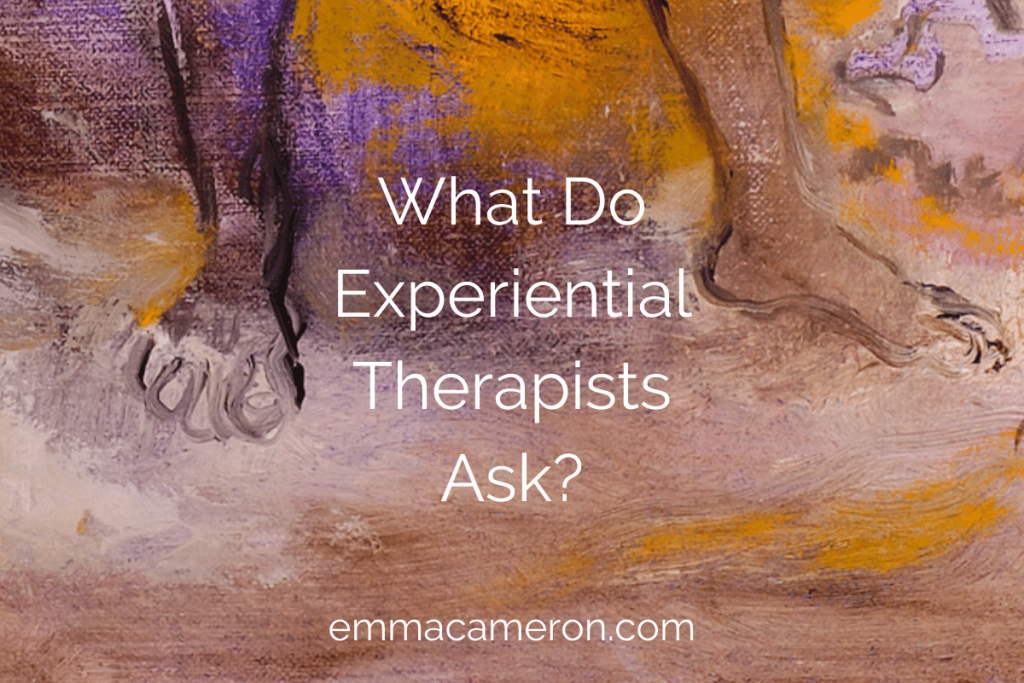
In part 1, ‘What is Experiential Therapy?’ we took a first look at experiential therapy. (If you haven’t read that, you can do so by clicking here). In this, part 2, we look at a few examples of the kinds of things experiential therapists might ask. We’ll also look briefly at some ways that an experiential therapist will help keep your session focused and on track, so as to be as helpful as possible. Finally, I offer a list of types of therapy that are experiential, as well as some that may not be.
What do experiential therapists ask?
Here are some examples of questions that an experiential therapist might ask:
- What’s happening inside right now?
- What are you noticing in your body?
- Is there a feeling coming up right now?
- What’s it like to hear yourself say x?
- How did it land with you just now when I said x?
They will try to find appropriate moments and ways to say things, as most experiential therapists don’t want you to feel ‘put on the spot’ or like you’re being cross-examined. (Although ISTDP is an exception here, as it partly works through challenge and confrontation).
Sometimes, where appropriate, an experiential therapist might also tell you about something they’re noticing in themselves in that moment, if it looks like it might be useful for you to hear. For example, they might say ‘I’m noticing my breathing just got shallower – I wonder whether that might be happening for you too?’
(You can read more detail, and many more examples, in Hilary Jacobs Hendel’s fantastic book ‘It’s Not Always Depression’ which is based on AEDP)
What do experiential therapists focus on?
When you’re in your therapy session, your experiential therapist will be helping the two of you regularly return the focus to ‘You, Here, Now’ and how you experience your responses to the issues in your life. For example, the focus will keep coming round to:
- The present (versus the past or the future)
- Your feelings (more than your thoughts or behaviours)
- How you are responding to something (with less focus on what the ‘something’ was)
- Yourself (less speculating about other people in your life, and more focus on how YOU feel in relation to them)
- Specific examples of the problem coming up (not abstract, vague or general things)
This doesn’t mean that we can’t talk about the past, or your thoughts, or other people, etc. It just means that in experiential therapy we tend to keep present-moment experience in awareness. Why? Because it just works better! Talking ‘about’ things, or venting, can bring some relief sometimes, but it probably won’t spark the kind of healing and actual change that you want.
What kinds of things do Experiential therapists ask in sessions? Share on XWhich types of therapy are experiential?
Some therapy trainings specifically teach therapists how to work experientially. These include:
- Gestalt therapy
- AEDP (Accelerated Experiential Dynamic Psychotherapy)
- Focusing
- Sensorimotor psychotherapy
- EMDR
- SE (Somatic Experiencing)
- Art Therapy
- ISTDP (Intensive Short-term Dynamic Psychotherapy)
- APT (Affect Phobia Therapy)
Examples of therapies which might or might not have an experiential component, depending on the therapist/ how they were trained:
- Person-centred counselling
- Psychodynamic psychotherapy
- ACT (acceptance and commitment therapy)
- Existential therapy
- Psychoanalysis
- Jungian therapy
- Integrative counselling
- Integrative psychotherapy
Examples of therapy that typically would not have an experiential focus:
- CBT (cognitive behaviour therapy)
I hope this post has been useful. And if you’re a therapist, and want to hone your skills as an experiential therapist, maybe you’ll be inspired to seek out extra training, or perhaps work with a supervisor who can help you deepen into working more experientially.
Leave a Reply